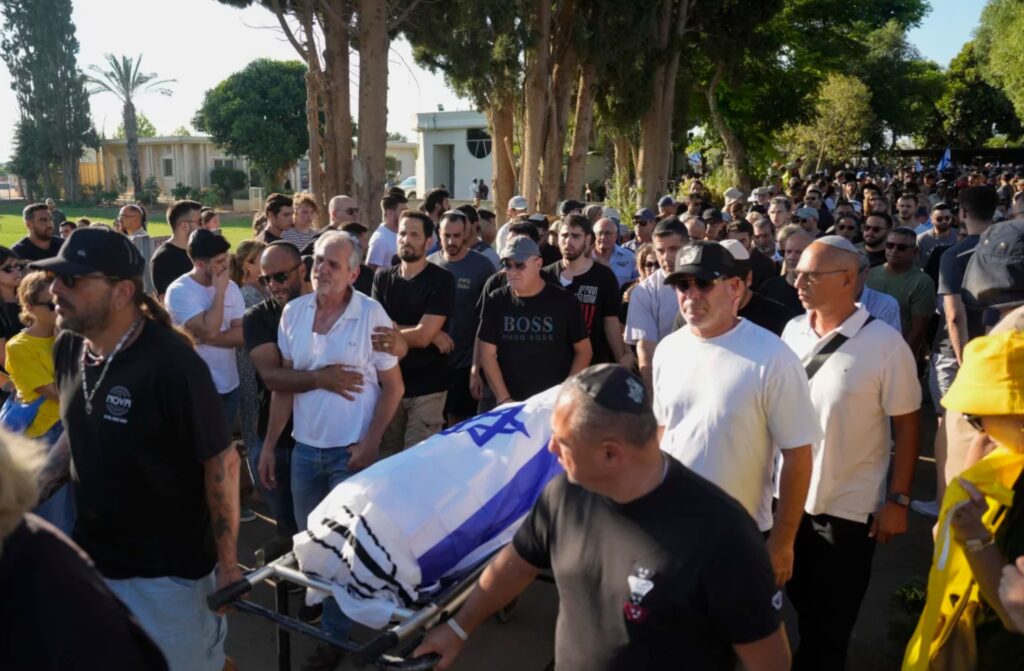The bodies of six hostages abducted by Hamas on 7 October have been recovered from a tunnel in southern Gaza shortly after they were murdered, the Israeli army announced on Sunday morning.
The chief military spokesperson said that the six were “brutally murdered” by Hamas shortly before troops arrived, possibly only a day or two before they were found. In previous cases, when bodies of hostages were found, the army was not always able to confirm the cause of death and it could have been execution by Hamas or Israeli bombardment.
The murdered hostages were Hersh Goldberg – Polin, 23, Eden Yerushalmi, 24, Ori Danino, 25, Alex Lubnov, 32, Carmet Gat, 40, and Almog Sarusi, 27. Five of them were taken hostages at a music festival and one of them from one of the villages near the border with the Gaza Strip. Three of them had been included in the first phase of the hostage deal currently on the table.
The parents of Hersh Goldberg – Polin, an American-Israeli citizen, had pleaded for a ceasefire-hostage deal and the rescue of all hostages at the recent Democratic National Convention in Chicago. “This is a political convention,” they said. “But needing our only son and all of the cherished hostages home is not a political issue. It is a humanitarian issue.”
"In an inflamed Middle East, we know the one thing that can most immediately release pressure and bring calm to the entire region: a deal that brings this diverse group of 109 hostages home and ends the suffering of the innocent civilians in Gaza.”
Their bodies were found during fighting in Rafah, in a tunnel 20 meters underground, about a kilometer away from the tunnel from which Farhan al-Qadi, 52, had been found alive only a few days earlier. Al-Qadi, from the Bedouin community in southern Israel, was working as a guard at one of the border villages when he was taken hostage. He had been left alone by his captors in a tunnel rigged with explosives when he was found.
“Since Farhan was found, troops were given an emphasis on operating carefully even more than usual, because of the understanding that additional hostages may be in the area,” the spokesperson said. “We did not have information on the exact location of the hostages.”
Al-Qadi was in surprisingly good health after having been kept in complete darkness in the tunnels for most of his 326 days in captivity. The first thing he said when Prime-Minister Netanyahu called him was to plead for the rescue of the remaining hostages who are suffering every day and will die if there is no hostage deal.
After months of negotiations, both Hamas and Israel had in principle agreed on the terms of a ceasefire-hostage deal. A three-phase roadmap to an enduring ceasefire and the release of the hostages was disclosed by US President Biden on 31 May. Since then, however, Netanyahu’s far-right government in Israel has added conditions that jeopardise the deal.
The final blow against an immediate ceasefire-hostage deal was dealt last Thursday evening when the Israeli cabinet voted for keeping a military presence at the so-called Philadelphi corridor along the border between Egypt and the Gaza Strip. The tunnels under the corridor have been used to smuggle weapons from Egypt into Gaza but most of them have already been destroyed.
According to the Israeli defense establishment, there is no need for a military presence there during the implementation of the ceasefire-hostage deal. If needed, Israeli troops could easily return there. “You are deciding to stay in the Philadelphi corridor. Is this logical to you? There are living hostages there!” the Israeli defense minister Galant was reportedly saying during the cabinet meeting.
“The prime minister can do as he likes,” one of Netanyahu's closest advisers replied. Galant, the only minister who voted against the cabinet decision, responded, “The prime minister can indeed make all the decisions, and he can also decide to kill all the hostages.” As long as Netanyahu has the backing of the Likud party, he continues to rule in an authoritarian way.
“The cabinet must gather immediately and reverse the decision made on Thursday," Galant twitted on Sunday. "It is too late for the hostages who were murdered in cold blood. We must bring back the hostages that are still being held by Hamas."
In a statement on Sunday, Netanyahu accused Hamas of refusing to conduct real negotiations. “Worse than that, at that very moment it murdered six of our hostages. He who murders hostages does not want a deal.” In fact, Hamas and the Netanyahu government are united in a common wish to continue the war.
Hamas fights for its survival and hopes that the war in Gaza, if it continues, will spill-over to a full-scale war with Iran and its proxies attacking Israel on all fronts. Netanyahu continues to talk about “total victory” and is pressured by his extremist coalition partners to continue the war to avoid the break-up of his government and stay in power until next ordinary elections in 2026.
In the meantime, the anger at the government’s indifference to the suffering of the hostages and the prolonging of the war has reached a boiling point. The families of the hostages, supported by large parts of Israeli society and the general federation of labour (Histadrut) , think that the only way to change course is the resumption of mass demonstrations against the government and a general strike that would paralyze the country.
EU’s foreign policy chief, Josep Borrell, announced at the informal foreign affairs council meeting last Thursday that he plans to explore the possibility of imposing sanctions against the Israeli finance minister and national security minister, two of the most far-right ministers, who are known for their hate speech and incitement to violence.
The national security minister keeps making provocative visits to the Temple Mount in Jerusalem that can lead to further escalation as they did in the past. Netanyahu could easily fire him and continue as prime-minister to next elections with the support of the opposition parties if he would agree to a ceasefire-and hostage deal now. Instead, his cabinet wrote that Galant has lost his senses.
In a tweet on Sunday afternoon, Borrell wrote that he is “horrified at the murder of 6 Israeli hostages of Hamas whose bodies were found in Gaza. These young innocent men women should have long been brought to safety & to their loved ones. We stand with all hostages. We need a ceasefire to end this tragedy & bring all hostages home.”
It is believed that 97 of the 251 hostages abducted by Hamas on 7 October remain in Gaza. At least 33 of them have been confirmed dead.


